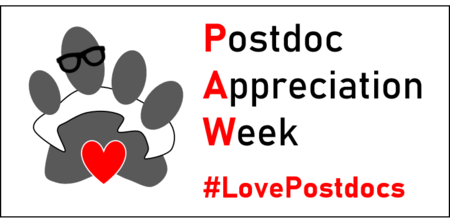
September 21, 2020, by Rob Ounsworth
Celebrating our postdocs
To mark National Postdoc Appreciation Week, we’ve asked some of our postdocs to reflect on their experiences and the support and opportunities available
Dr Nesma Aboulkhair
From a personal perspective, I found the ECR (Early Career Researcher) Leadership Programme, which is run by the universities of Nottingham and Birmingham, was excellent. As postdocs, it’s easy to get involved in your very specific research and lose track of the big picture. The programme is a chance to pick up new skills and briefly stop your journey to reflect on where you are and what you have achieved as an all-rounded researcher.
There are several funding opportunities aimed at ECRs and it is very important to grasp these while you can, to start the learning curve slightly earlier than is perhaps the norm in an academic career.
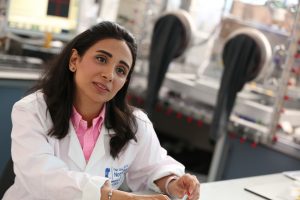
Nesma Aboulkhair: “There are several funding opportunities aimed at ECRs and it is very important to grasp these while you can.”
Being a postdoc and an Anne McLaren Fellow has been an enriching experience. After you finish your PhD, you realise that you have spent three years of your career life focusing on a very specific point of research, which is essential, but to be able to further progress, your scope and skillset need to be significantly widened and this is what you get from being a postdoc. I’ve enjoyed collaborations with researchers around the world and had the freedom to research the things I am really passionate about while developing my own independence as a researcher.
The diverse community of researchers at Nottingham is an amazing vehicle in expanding my knowledge and experience. The discussions run by research centres and groups are a shortcut to learn more and not having to reinvent the wheel every time I wanted to explore a new area of research.
Nesma is an Anne McLaren Fellow based in the Centre for Additive Manufacturing, Faculty of Engineering, where her research into novel 3D printing of metals is at the forefront of a new industrial revolution
@ntaboulkhair
Postdoc Appreciation Week (Monday 21 September to Friday 25 September) celebrates the fantastic contribution postdocs and researchers make towards research and academic life. The University of Nottingham is one of the supporting universities, thanks to the efforts of Alison Tidy, a Research Fellow in the School of Biosciences who is co-Chair of the UK Research Staff Association.
Dr Jane Wellens, Head of the Researcher Academy, said: “Our postdoctoral researchers are highly valued members of our research staff and their contribution is is hugely appreciated by the University, not just in terms of their immediate research but in wider community building, knowledge exchange and student support.”
Follow #LovePostdocs and #NPAW2020 to get involved
Dr Sarah Martindale
I suppose I’m fairly atypical – I am in my 9th year as a postdoc, and I spent eight of those years with Computer Sciences as a Research Fellow at Horizon Digital Economy Research. I’m now based in Cultures, Languages and Area Studies but continue to work closely with Horizon and the Mixed Reality Lab. I’m interested in how people attach meaning and value to digital interactions and new media.
I was a co-lead of the Creative and Digital Research Priority Area, which has now transitioned into one of the new Interdisciplinary Research Clusters. I really appreciate the opportunity to work with senior research leaders on big grant applications and the subsequent projects, as well as co-authoring major publications.
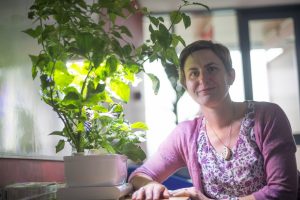
Sarah Martindale: “My own research benefits hugely from collaboration with the next generation of PGRs.”
I’m interested in helping to establish new research leaders. Working with Horizon’s EPSRC Centre for Doctoral Training I’ve been able to help train cohorts of PhD students during Year 1 on research methods, practice-led projects, the global impacts of digital technologies, public engagement and professional skills. I’ve also co-supervised PhD projects, learning from more experienced colleagues in the process. My own research benefits hugely from collaboration with the next generation of PGRs.
Being a Nottingham Research Fellow has given me the opportunity to work for a sustained period across disciplines, which is so rewarding and insightful.
Sarah is based in the Department of Cultural, Media and Visual Studies, where her latest research on the impact of digital tech on the creative industries is focusing on lockdown and the implications of live entertainment moving into online and virtual worlds.
@DrSMartindale
Dr Rebecca Dewey
I have always made every possible effort to try and grab any opportunity available to me. I’ve undertaken a media fellowship, been a peer reviewer for the Graduate School mobility awards as well as a recipient of a BESTS (mobility award), visiting Hitachi in Japan.
The collective result of this is more exposure and a wider variety of experiences. The media fellowship was so much fun – I got to read out a press release live on BBC Radio 2 on my first day! The mobility award gave me a wonderful insight into working closely with industry, before and after my visit to Hitachi. Becoming a peer-reviewer was an obvious next step for me, as it gives me the insight into how the other side of the system works, as well as giving me that cerebral workout which will help me build the skills I need for progressing through academia.
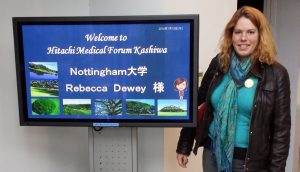
Rebecca Dewey at Hitachi in Japan: The mobility award gave me a wonderful insight into working closely with industry
The Researcher Academy provides so many exciting opportunities to make your path more varied, push you out of your comfort zone, or expand your experiences.
COVID-19 has hit everyone hard, and those of us on fixed-term contracts have even less certainty in our future at the moment. The job market is not healthy, and it’s hard not to have imposter syndrome when you’ve just spent six months working from home on a laptop with none of the usual professors, equipment and experiments around you. The academic community has been making some important progress towards inclusion and supporting the whole person, not just the work. I hope we don’t forget that and take a step backwards.
Rebecca is a Research Fellow in Neuroimaging based in the NIHR Nottingham Hearing Biomedical Research Unit, School of Medicine, where she uses MRI to improve diagnosis and treatment of hearing loss and other auditory disorders.
@rebecca_penguin
Dr Richard Urbanowicz
Life as a postdoctoral researcher can be hard at times, with uncertainty over career prospects and where the next grant funding is coming. Being part of a community is essential – you are not alone. The School of Life Sciences has always been supportive of events organised by our postdoc group. The Graduate School has always been a great resource and I’m really excited to see the newly formed Researcher Academy.
The PostDoc group committee is made up of researchers from different stages of their career, which allows us to consider all aspects of the journey. One of the successful events we held pre-lockdown was a ‘warts and all’ picture of how people got to be a fellow or lecturer. This was only possible because of the outstandingly brave presenters, willing to share their journeys.
As a postdoc, I’d say it’s important to forge collaborations from any given opportunity. It’s a cliché, but you never know when they’ll ‘pay dividend’, or what that will look like. I feel that it is important to have a varied network of peers and contacts, to act as mentors, sounding boards or just someone to grab a drink with at a conference. For me, I’ve had sit down meetings with professors that resulted in nothing more than a pleasant chat, whilst others have turned into grant applications, publications and a training visit for their PhD student.
Richard is a Senior Research Fellow in the School of Life Sciences and as a member of the Virology group is currently involved in SARS-CoV-2 projects investigating antibody and cell-mediated immunity to COVID-19.
@rich_urbanowicz
Researcher Academy
The Researcher Academy is building on the legacy of the Graduate School to become a network for the whole of the researcher community, from postgraduate researchers and postdocs through to senior research leaders, as well as those working in roles that support them.
Support and initiatives for postdocs includes:
The twice-yearly retreats on University Park give researchers three days of peace and quiet to focus on writing up a grant or fellowship application or perhaps a research publication. A virtual retreat was held during lockdown and for 2020/21 a further virtual, and, hopefully, on-site retreat are planned.
Dr Lisa White, an assistant professor in the School of Pharmacy and former Anne McLaren Fellow, said: “The writing retreat is a fantastic opportunity to think, plan and write. The dedicated time away from meetings, lab work and other commitments has particularly allowed me to focus on starting grants – mapping ideas and plans on large pads of paper. I have attended this four or five times now and at each retreat have made great progress on writing papers and grants.”
Careers and Employability Service
Nottingham is one of few Russell Group universities with a full-time senior careers advisor dedicated to research-only staff. The service also offers ECRs a CV bootcamp. A virtual pilot was held in July with eight researchers and this will return for 2020/21.
Our new postdocs are welcomed to a two-hour induction event, which runs twice a year and is being offered virtually for the new 2020/21 session.
Teaching opportunities are also offered by the Researcher Academy and faculty training programme courses. Faculty specific initiatives for postdocs also include the Engineering Research Futures programme , and the Researcher Academy has appointed academic faculty leads to further support relationships with PGRs and postdocs.
No comments yet, fill out a comment to be the first

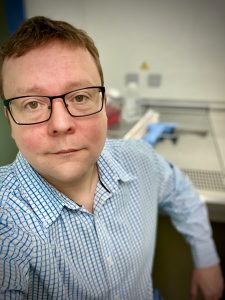
Leave a Reply